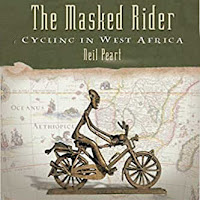This is a brief review of
The Masked Rider: Cycling in West Africa, by Neil Peart (1952-2020), ECW Press 2004.
From the opening of this book about bicycling across Cameroon, I inferred that I was going to get to know more about the people of West Africa. After all, the author said that he'd heard you visited East Africa to get to know the wildlife and West Africa to get to know the people.
Well, I don't want to speak ill of the dead, but Peart's narrative left a great deal to be desired.
Though I was never a Rush fan, I'm sure he was a great musician, respected by many in the business. But I found this book to be condescending, disrespectful, and misogynistic.
The most glaring problem with
The Masked Rider was that it contained literally zero (0) meaningful exchanges with West African people. The vast majority of his encounters were brief, but negative. Most Africans were portrayed as selfish, ignorant, cruel, or indifferent. A few were kind or helpful, but they were in the minority. However, none were in any way the equal of the author, nor did we learn anything meaningful about any of them—seldom even a name. Indeed, the nicknames he stuck on them were often derisive.
One surprising aspect of the book was how misogynistic the author was. This was most notable when he encountered women whom he assumed (usually based on very flimsy evidence) to be sex workers. He quickly and unapologetically referred to them as "whore" or "bimbo".
Bizarrely, at one point, Peart felt it necessary to reveal some of his political views when recounting a conversation about big oil between him and his fellow cyclists. He was flabbergasted that they were gullible enough to believe that there was some sort of collusion between oil companies and governments to discourage development of alternative energy sources. Perhaps it was he who was the gullible one.
Finally, though the book did not purport to be about the landscape of the places he visited, I think it was a reasonable expectation to have some of it portrayed by a person bicycling through it. There was occasional reference to its ugliness, but not one mention of its beauty.
After after all's said and done, I would not recommend this book. It rolls a ⚁.

